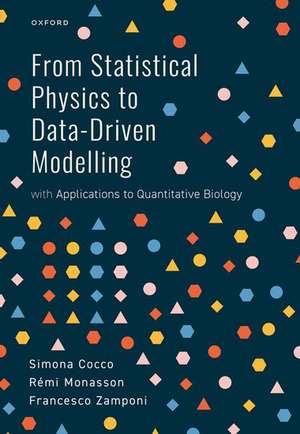From Statistical Physics to Data-Driven Modelling: with Applications to Quantitative Biology
Autor Simona Cocco, Rémi Monasson, Francesco Zamponien Limba Engleză Hardback – 9 sep 2022
Preț: 341.12 lei
Preț vechi: 387.56 lei
-12% Nou
Puncte Express: 512
Preț estimativ în valută:
65.29€ • 67.28$ • 55.12£
65.29€ • 67.28$ • 55.12£
Carte disponibilă
Livrare economică 29 ianuarie-04 februarie
Preluare comenzi: 021 569.72.76
Specificații
ISBN-13: 9780198864745
ISBN-10: 0198864744
Pagini: 192
Ilustrații: 66 b/w figures and 10 colour images
Dimensiuni: 175 x 242 x 14 mm
Greutate: 0.53 kg
Ediția:1
Editura: OUP OXFORD
Colecția OUP Oxford
Locul publicării:Oxford, United Kingdom
ISBN-10: 0198864744
Pagini: 192
Ilustrații: 66 b/w figures and 10 colour images
Dimensiuni: 175 x 242 x 14 mm
Greutate: 0.53 kg
Ediția:1
Editura: OUP OXFORD
Colecția OUP Oxford
Locul publicării:Oxford, United Kingdom
Recenzii
This book addresses crucially important questions and delivers a unique outlook on a timely topic.
Modern post-genome biology and medicine are in the middle of a quantitative revolution and this unique and timely book by three experienced researchers will be indispensable to anyone studying or interested in the topic.
This is a much-needed text on an extremely relevant topic, written by three authors with considerable experience and expertise.
Modern post-genome biology and medicine are in the middle of a quantitative revolution and this unique and timely book by three experienced researchers will be indispensable to anyone studying or interested in the topic.
This is a much-needed text on an extremely relevant topic, written by three authors with considerable experience and expertise.
Notă biografică
Simona Cocco is a research Director at the Ecole Normale Supérieure in Paris, working on statistical physics, biophysics, and inference of models from data. In 2000, she received a double PhD in Physics from the Ecole Normale Supérieure in Lyon and Biophysics from the University of Rome “Sapienza” and was then a postdoc at the ENS in Paris and in Chicago, before joining the CNRS in 2001 as a permanent researcher. Between 2009 and 2011 she was a senior member at the Institute of Advanced Study in Princeton.Rémi Monasson is a research Director at the CNRS and the Ecole Normale Supérieure, and a professor at the Ecole Polytechnique. He did his PhD on the statistical mechanics of neural networks, and was then a postdoc in Rome, working on disordered systems and phase transitions in optimisation problems. He later worked on biophysics and systems biology in Chicago and at the Institute for Advanced Study in Princeton. His research interests lie at the intersection of statistical physics, machine learning and computational biology.Francesco Zamponi received his PhD in Theoretical Physics from the University of Rome “Sapienza” and was then a postdoc at the ENS and the CEA in Paris, before joining the CNRS in 2008 as a permanent researcher. He is currently based at the Physics Department of the ENS in Paris. His research is driven by the application of ideas and methods issued from the statistical mechanics of complex systems, to problems arising in classical and quantum condensed matter, biology, information theory, and mathematics. He has published over 130 research articles, and is the author of a chapter for the Handbook of Satisfiability (IOS Press 2021) and a book on the Theory of Simple Glasses (Cambridge University Press 2019). He was awarded an ERC Consolidator grant (GlassUniversality) and is one of the Principal Investigators of the Simons collaboration on ‘Cracking the glass problem’.
